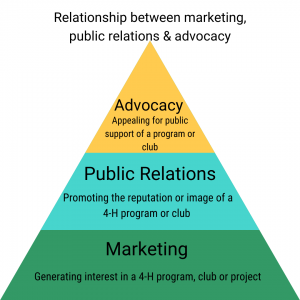
Marketing provides a foundation for public relations and advocacy. All three actions have implications for volunteers, parents and members.
The terms marketing, public relations and advocacy are often used interchangeably, but they are not the same. However, all three of these actions support our 4-H clubs and projects. Over the next couple of weeks, we will break down each term and talk about how 4-H volunteers and members can use these actions to benefit their clubs and projects.
Marketing is simply the act of generating interest in your 4-H club or project. It can be through word of mouth, media, or displays at community events or businesses. Public relations goes a step further than just generating interest; it is about promoting a club or program’s reputation and image. Advocacy is the most advanced action of the three, and it is the act of using a program’s reputation and value to generate public and even monetary support.
At first glance, you might think that marketing is the responsibility of the 4-H agent, and it is (at least for the total 4-H program). However, marketing has important implications at the club and individual member levels that volunteers, parents and youth should consider:
- Marketing the Club- recruit additional members and volunteers
- Marketing the Project- generate interest in project sales or secure a buyer for a market animal project
- Marketing your Skills- use 4-H experiences to market workforce skills for your resumé and prepare for school, scholarship or job interviews.
Marketing the 4-H Club
In order to be chartered, clubs must have a minimum of five youth from at least two different families. Marketing is a great way to recruit members for new clubs, but sometimes club rosters may dwindle due to circumstances beyond the volunteer’s or parent’s control such as a change in job, move to a different community, schedule change or even a change in school. A static display at the local library or school or even a press release or social media post can generate new members for your club.
Another reason why volunteers may want to engage in marketing relates to diversity and inclusion. 4-H is a three-way partnership between the federal, state and local governments. As such, 4-H is a non-discriminatory program and annually, 4-H programs must provide evidence that their programs are open to all. If your club is not representative of your community’s demographic make-up, your 4-H agent may ask you to conduct “All Reasonable Efforts.” This is a process to verify that the club has made efforts to engage youth who are representative of their community. Your local 4-H agent can help you identify opportunities to market your club and record those efforts on the “All Reasonable Efforts” checklist.
Marketing the 4-H Project
One of the great things about 4-H is it is a safe place for youth to learn about business and entrepreneurship. Many (if not most) 4-H projects offer opportunities for youth to learn financial literacy skills. Whether it is selling an animal for food, or so that other youth can start a herd or flock, there are opportunities for youth to market their project to generate sales or secure a buyer for their animal. Check out this website from Penn State on tips for identifying potential buyers, drafting a letter to buyers and how to prepare your personal sales pitch.
Marketing Your Skills
To be prepared for work and life, 4-H youth need to learn how to present themselves to potential employers. It can be hard to get that first job or internship when you have no previous experience. Use your 4-H project, leadership and citizenship experiences! The 4-H “Marketing You” worksheet can help you identify marketable workforce skills you have learning through your 4-H experiences to make you a competitive applicant for a job, scholarship or entry into college or trade school. The Florida 4-H Next Stop Job program walks you through how to:
- Meet our Summer Intern- Andy Franklin! - June 13, 2025
- Blue Ribbon Baked Goods - September 23, 2024
- Blue Ribbon Photos and Posters - September 21, 2024
